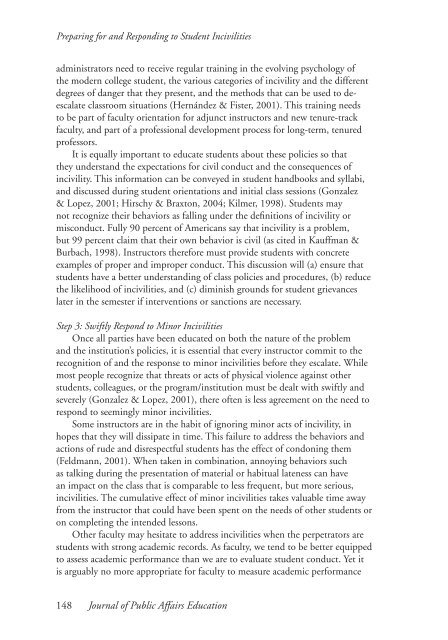JOURNAL OF PUBLIC AFFAIRS EDUCATION - Naspaa
JOURNAL OF PUBLIC AFFAIRS EDUCATION - Naspaa
JOURNAL OF PUBLIC AFFAIRS EDUCATION - Naspaa
You also want an ePaper? Increase the reach of your titles
YUMPU automatically turns print PDFs into web optimized ePapers that Google loves.
Preparing for and Responding to Student Incivilitiesadministrators need to receive regular training in the evolving psychology ofthe modern college student, the various categories of incivility and the differentdegrees of danger that they present, and the methods that can be used to deescalateclassroom situations (Hernández & Fister, 2001). This training needsto be part of faculty orientation for adjunct instructors and new tenure-trackfaculty, and part of a professional development process for long-term, tenuredprofessors.It is equally important to educate students about these policies so thatthey understand the expectations for civil conduct and the consequences ofincivility. This information can be conveyed in student handbooks and syllabi,and discussed during student orientations and initial class sessions (Gonzalez& Lopez, 2001; Hirschy & Braxton, 2004; Kilmer, 1998). Students maynot recognize their behaviors as falling under the definitions of incivility ormisconduct. Fully 90 percent of Americans say that incivility is a problem,but 99 percent claim that their own behavior is civil (as cited in Kauffman &Burbach, 1998). Instructors therefore must provide students with concreteexamples of proper and improper conduct. This discussion will (a) ensure thatstudents have a better understanding of class policies and procedures, (b) reducethe likelihood of incivilities, and (c) diminish grounds for student grievanceslater in the semester if interventions or sanctions are necessary.Step 3: Swiftly Respond to Minor IncivilitiesOnce all parties have been educated on both the nature of the problemand the institution’s policies, it is essential that every instructor commit to therecognition of and the response to minor incivilities before they escalate. Whilemost people recognize that threats or acts of physical violence against otherstudents, colleagues, or the program/institution must be dealt with swiftly andseverely (Gonzalez & Lopez, 2001), there often is less agreement on the need torespond to seemingly minor incivilities.Some instructors are in the habit of ignoring minor acts of incivility, inhopes that they will dissipate in time. This failure to address the behaviors andactions of rude and disrespectful students has the effect of condoning them(Feldmann, 2001). When taken in combination, annoying behaviors suchas talking during the presentation of material or habitual lateness can havean impact on the class that is comparable to less frequent, but more serious,incivilities. The cumulative effect of minor incivilities takes valuable time awayfrom the instructor that could have been spent on the needs of other students oron completing the intended lessons.Other faculty may hesitate to address incivilities when the perpetrators arestudents with strong academic records. As faculty, we tend to be better equippedto assess academic performance than we are to evaluate student conduct. Yet itis arguably no more appropriate for faculty to measure academic performance148 Journal of Public Affairs Education
















